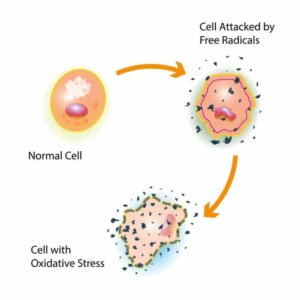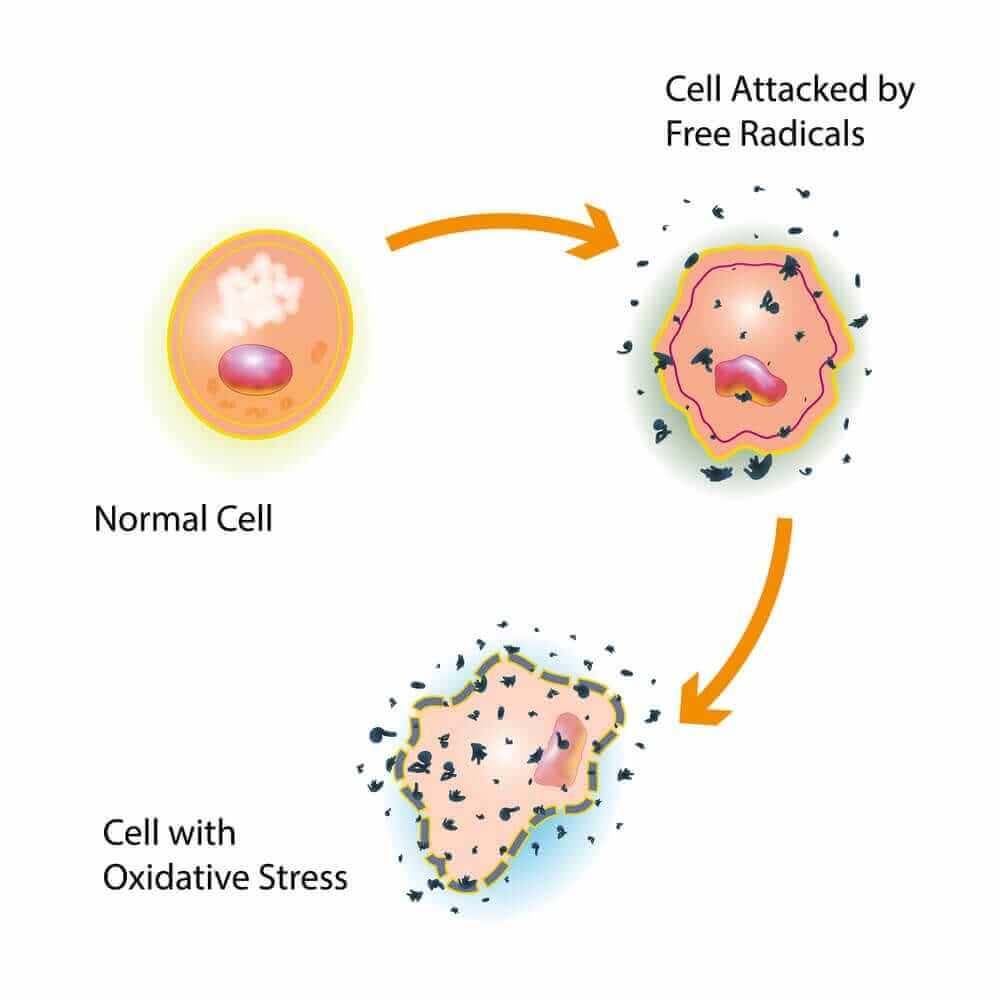How do free radicals and oxidative stress impact your horse or your dog? Free radicals are an important entity in chemistry and in horse health, having been researched for many years with connections to cellular changes that may impact overall health, soundness, and aging. A free radical is a molecule that has an unpaired electron in the outer shell, which creates instability and a high rate of reactivity with other molecules. Free radicals are produced as a normal part of cellular respiration or energy production, but can also be generated as a consequence of environmental factors, stress, poor diet, food additives, medications, and genetics. In general, through the process of oxidative stress, free radicals can have huge negative impacts on overall health, performance, and longevity in the horse and dog. The good news is that with understanding, we also realize that there are things we can do to minimize the damage inflicted.

As part of normal cellular and immune function, some free radicals are readily produced as part of our defense mechanism. Two examples would include the hydroxyl- radical and superoxide anion, which are produced and released by various immune cells to ward off invading bacteria and other pathogens. Most free radicals produced in the body are of oxygen or nitrogen derivatives. In the case where they are oxygen derived, they are termed ‘reactive oxygen species‘, and in the opposite ‘reactive nitrogen species‘ when nitrogen derived.
Re-Dox and Oxidative Stress
As part of understanding free radicals, we must also address the topic of ‘Redox’ or ‘reduction and oxidation’, as this is a never ending process within our horses’ bodies and their environment.
- Oxidation: The process whereby a molecule loses an electron, in the process becoming a free radical
- Reduction: The process whereby a molecule gains an electron, becoming more stable
- Oxidizer: A substance which can cause another to lose an electron, thereby gaining an electron itself and becoming reduced
- Reducer: A substance which causes another to gain an electron, thereby losing an electron itself and becoming oxidized
The take home point to all of this is the “Redox” process is constantly occurring in every horse and dog, and free radicals are constantly being generated. Free radicals and reactive oxygen species are important for various aspects of health and homeostasis, but in high levels, they can inflict serious damage upon the body, termed “Oxidative Stress”.
In reality, health is about a balance between oxidation and reduction.
Did you know that increased stress (emotional/physical), training, exercise and competition all increase the rate of free radical production in the horse’s body?
How Do Free Radicals Negatively Impact Horse and Dog Health?
- Cause mutations and damage to DNA
- Cause damage to cellular function
- Oxidize proteins and fats
- Impact cellular processes
If free radical are being produced and causing potential damage, how do we protect our horses and dogs?
Protecting Your Horse and Dog Against Damaging Free Radicals
The body naturally produces internal antioxidants including glutathione, SOD, Catalase and NADPH, which help to control and minimize damage due to excess free radicals. In addition, we can consume many varieties of naturally occurring substances that are antioxidants themselves, including certain herbs and vitamins.
Antioxidants are essentially reducing agents, donating electrons to unstable free radicals, thereby helping to stabilize them and mimize damage occuring to the body. The problem with most antioxidants is that once they donate an electron, they become oxidized themselves, becoming a free radical and MUST be recharged or reduced by another substance. This raises the importance of consuming a variety of antioxidants in our diet in order to promote this ‘recharging’ type of effect. Nutrition is also important because it ensures that we are taking in the vital nutrients needed for the body to make our internal glutathione and other naturally occurring antioxidants; including L-glutamine, L-cysteine and glycine.
Free radical damage or ‘oxidative stress’ has been implicated in a variety of diseases (horse and dog), contributing to disease progression and severity. This can include metabolic problems, joint deterioration, immune related disorders, cardiovascular disease and performance issues, allergies and even cancer. In fact, there are many theories that reactive oxygen species are the number one cause of aging, due to ongoing mitochondrial damage.
Mitochondrial damage or dysfunction is thought to contribute not only to aging but many diseases including Alzheimer’s and even cancer. The mitochondria is linked directly with energy production within the body and thereby cellular health and function. The damage is thought to occur over time due to the accumulation of free radical damage to the mitochondrial within the cell as a result of accumulation of hydrogen peroxide molecules. This damage can then impact the DNA and lead to mutations and alterations in cellular function on many levels. This event can impact overall horse and dog health and soundness.
Conditions connected with Oxidative Stress and Mitochondrial Dysfunction:
| Horse | Pets | |
| Joint Dysfunction | Joint Dysfunction | |
| Metabolic Problems | Metabolic Problems | |
| Cardiovascular Disease | Cardiovascular Disease | |
| Allergies | Allergies | |
| Gastrointestinal Problems | Gastrointestinal Problems | |
| Immune Dysfunction | Immune Dysfunction | |
| Tendon Injuries | Tendon Injuries | |
| Cancer | Cancer | |
| Reproductive Issues | Reproductive Issues | |
| Eye Disease | Eye Disease | |
| Neurological Problems | Neurological Problems | |
Antioxidants, Phytochemicals, and Herbs To The Rescue!
In horses oxidative damage is connected with a variety of diseases and joint dysfunction. Some other conditions in the horse include metabolic, performance related problems and even tendon injuries. In fact, the ongoing oxidative stress that is occuring likely in all of our bodies is directly connected with chronic inflammation, which when partnered, becomes a cyclic cascade of negative events that impact health.
Nutrition is the key to protecting ourselves, our pets and our horses! Through nutrition, we are able to take in vital nutrients and antioxidants in their natural form which help to promote normal cellular function and provide protection. Increasing our daily intake of antioxidants through supplements is also very important, especially in times of disease, stress or injury as they aid in cellular repair.
Antioxidants include Vitamin E, Vitamin C, CoQ10, Alpha Lipoic Acid, Beta-carotene, Selenium and many others, but we must not forget that several herbs also provide antioxidant protection and help us to promote a healthy inflammatory response.
A few important herbs that have direct antioxidant capabilities include:
- Curcumin (Turmeric)
- Boswellia
- Spirulina
- Milk thistle
- Ashwaghanda
- Bacopa
- Schisandra
- Hawthorne
- Pomegranate
- Medicinal mushrooms (Ganoderma, Cordyceps)
- and many others…..
Oxidative damage is often linked with the development of various health conditions and injuries in the horse and dog, but is also present as part of the aftermath of the healing process. If it is not controlled adequately, it can continue to predispose the individual to future problems and health concerns, plus impact the overall healing and recovery process.
At Nouvelle Research, our goal is to combat this ongoing process and provide a better means of management. Through our Cur-OST® formulas for both the horse and dog, oxidative stress, free radical damage, and ongoing inflammatory changes can be better balanced for overall health.
So, the bottom line is that oxidative damage is occurring in every horse and dog on some level. The question comes as to what you are doing to help the body to protect itself and heal properly?
All my best,
Tom Schell, D.V.M.
Nouvelle Research, Inc.
www.nouvelleresearch.com


